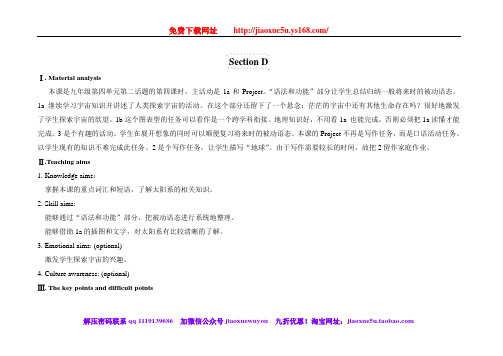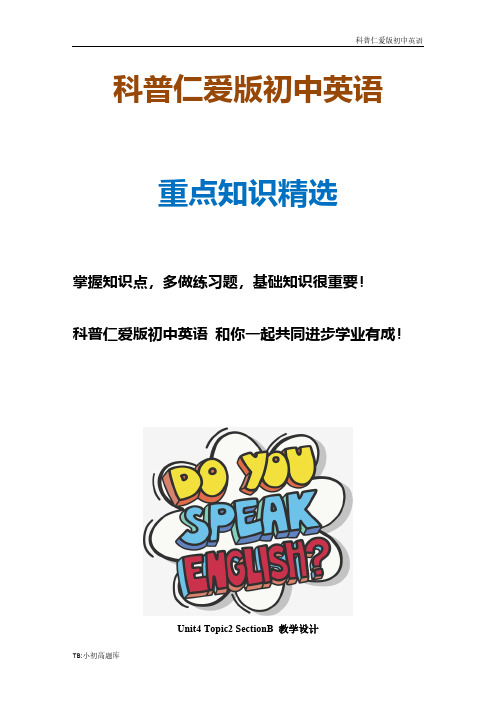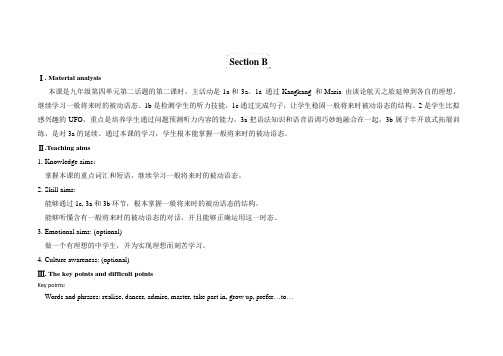仁爱初中英语九上精品教案设计U4T2SC
仁爱版九年级英语上册Unit4Topic2SectionB教案

仁爱版九年级英语上册Unit4Topic2SectionB教案Unit 4 Amazing ScienceTopic 2 Section B教案Teaching aims and demands1. Learn some new words: basic, risk2. Consolidate the usage of modal verb+be+P.P:(1) More and more things will be discovered in the future.(2) The girl will be well cared for.(3) These trees should be watered at once.3. Talk about flying to Mars and the outer space.Teaching aids录音机/幻灯片Teaching PlanStep 1 Review提问关于太空和人类对太空的研究的一些问题。
T: What movie did Michael and Jane see yesterday?S1: They saw a movie about the life in space.T: Does Michael believe there are aliens?S2: No, he doesn’t believe it.T: And you? Do you believe there are aliens?S3: No, I don’t believe it. Because they cannot be seen.(很有可能出现不同意见,那样更有利于进一步的复习提问。
) T: Do you believe there are aliens?S4: Yes, I do.T: What can be done to find them out if there are aliens in the space? S5: Satellites and spaceships should be sent up.S6: Other planets may be visited.S7: More scientific research should be done carefully.T: Good idea. If people do more scientific research, I believemore and more unknown things will be discovered in the future. Now we’re at school to learn the basic knowledge. We should work hard and then we can discover the unknown things.T: Were you excited about the news of Shenzhou VI?Ss: Yes, of course.T: What did they do during the flight?S8: They took photos.S9: They recorded their activities with a DV.S10: …T: Do you want to fly in the spaceship one day?Ss: Yeah.T: Now, man has a plan to fly to the Mars. The astronauts from China, the United States and Russia will finish the task together. I really admire the astronauts.(教师释义并领读admire。
湘教版仁爱版初中英语九年级上册精品教案设计U4T2SD

Section DⅠ. Material analysis本课是九年级第四单元第二话题的第四课时。
主活动是1a和Project。
“语法和功能”部分让学生总结归纳一般将来时的被动语态。
1a 继续学习宇宙知识并讲述了人类探索宇宙的活动。
在这个部分还留下了一个悬念:茫茫的宇宙中还有其他生命存在吗?很好地激发了学生探索宇宙的欲望。
1b这个图表型的任务可以看作是一个跨学科衔接。
地理知识好,不用看1a 也能完成,否则必须把1a读懂才能完成。
3是个有趣的活动。
学生在展开想象的同时可以顺便复习将来时的被动语态。
本课的Project不再是写作任务,而是口语活动任务。
以学生现有的知识不难完成此任务。
2是个写作任务,让学生描写“地球”。
由于写作需要较长的时间,故把2留作家庭作业。
Ⅱ.Teaching aims1. Knowledge aims:掌握本课的重点词汇和短语,了解太阳系的相关知识。
2. Skill aims:能够通过“语法和功能”部分,把被动语态进行系统地整理。
能够借助1a的插图和文字,对太阳系有比较清晰的了解。
3. Emotional aims: (optional)激发学生探索宇宙的兴趣。
4. Culture awareness: (optional)Ⅲ. The key points and difficult points解压密码联系qq 1119139686 加微信公众号jiaoxuewuyou 九折优惠!淘宝网址:1. Key points:Words and phrases: launch, beyond, send…to…Sentences: The sun and its planets are called the solar system.Some spaceships have gone beyond the solar system.Grammar: sum up future passive voiceDifficult points:With so many stars in space, are we alone, or is there life on other planets in space?Ⅳ. Learning strategies学会梳理和总结归纳已学知识以便更好地记忆、理解和使用。
科普仁爱版初中英语九年级上册Unit4 Topic2 SectionB 教学设计

掌握本课的重点词汇和短语,继续学习一般将来时的被动语态。 2. Skill aims:
能够通过 1c, 3a 和 3b 环节,基本掌握一般将来时的被动语态的结构。 能够听懂含有一般将来时的被动语态的对话,并且能够正确运用这一时态。 3. Emotional aims: (optional) 做一个有理想的中学生,并为实现理想而刻苦学习。 4. Culture awareness: (optional) Ⅲ. The key points and difficult points Key points: Words and phrases: realize, dancer, admire, master, take part in, grow up, prefer…to… Sentences: What are you going to be?
what theyபைடு நூலகம்are going to be going to be in the 旨 在 引 起
in the future.
future.
学生对于
T: Do you want to be Ss: Yes.
未来的憧
admired by other people in
仁爱版九上英语教案:Unit 4 Topic 2 Section D

Unit 4 Amazing ScienceTopic 2 I’m excited about the things that will be discovered in the future.Section DⅠ. Material analysis本课是九年级第四单元第二话题的第四课时。
主活动是1a和Project。
“语法和功能”部分让学生总结归纳一般将来时的被动语态。
1a 继续学习宇宙知识并讲述了人类探索宇宙的活动。
在这个部分还留下了一个悬念:茫茫的宇宙中还有其他生命存在吗?很好地激发了学生探索宇宙的欲望。
1b这个图表型的任务可以看作是一个跨学科衔接。
地理知识好,不用看1a 也能完成,否则必须把1a读懂才能完成。
3是个有趣的活动。
学生在展开想象的同时可以顺便复习将来时的被动语态。
本课的Project不再是写作任务,而是口语活动任务。
以学生现有的知识不难完成此任务。
2是个写作任务,让学生描写“地球”。
由于写作需要较长的时间,故把2留作家庭作业。
Ⅱ.Teaching aims1. Knowledge aims:掌握本课的重点词汇和短语,了解太阳系的相关知识。
2. Skill aims:能够通过“语法和功能”部分,把被动语态进行系统地整理。
能够借助1a的插图和文字,对太阳系有比较清晰的了解。
3. Emotional aims: (optional)激发学生探索宇宙的兴趣。
如果没有您爱的滋润,怎么会绽放那么多美好的灵魂之花!4. Culture awareness: (optional)Ⅲ. The key points and difficult points1. Key points:Words and phrases: launch, beyond, send…to…Sentences: The sun and its planets are called the solar system.Some spaceships have gone beyond the solar system.Grammar: sum up future passive voiceDifficult points:With so many stars in space, are we alone, or is there life on other planets in space?Ⅳ. Learning strategies学会梳理和总结归纳已学知识以便更好地记忆、理解和使用。
仁爱版九年级英语上册Unit4Topic2.Ix27mexcitedaboutthet

Unit 4 Amazing Science Topic 2 I ’ m excited about the thingsthat willbe discovered in the future.Section A【学习目标】1.复习一般现在时及一般过去时的被动语态;引入一般将来时被动语态的学习。
2.学习一般将来时的被动语态的构造【学习重难点】一般将来时的被动构造【学习过程】一、复习:达成以下练习( ) 1. Each year quite a lot of food ____ around the world .It ’reallys time for us to do something.A .was wasted B. is wasted C.wasted D.will be wasted( ) 2.Many buildings in Sichuan ____ in the earthquake in 2008.A .have destroyed B. are destroyed C.were destroyed D. are destroying( ) 3.Today, computers are really helpful. They _______ everywhere.A .use B. are used C.used D.were used( ) 4.Chinese ______ by more and more people from all over the world today.A .learn B. learned C.is learned D. was learned( )5.Hot water ______ in the students(公’寓flats)from 5p.m. to 7 p.m. now.A .supplies B.is supplied C.supplied D. was supplied总结:( 1)一般现在时的被动语态:be( is / am / are )+ done(过去分词)(2)一般过去时的被动语态:be(was / were )+ done(过去分词)联想:一般将来时的被动语态:。
仁爱初中英语九上精品教案设计U4T2SB

Section BⅠ. Material analysis本课是九年级第四单元第二话题的第二课时。
主活动是1a和3a。
1a 通过Kangkang 和Maria 由谈论航天之旅延伸到各自的理想,继续学习一般将来时的被动语态。
1b是检测学生的听力技能,1c通过完成句子,让学生稳固一般将来时被动语态的结构。
2是学生比拟感兴趣的UFO,重点是培养学生通过问题预测听力内容的能力。
3a把语法知识和语音语调巧妙地融合在一起。
3b属于半开放式拓展训练,是对3a的延续。
通过本课的学习,学生根本能掌握一般将来时的被动语态。
Ⅱ.Teaching aims1. Knowledge aims:掌握本课的重点词汇和短语,继续学习一般将来时的被动语态。
2. Skill aims:能够通过1c, 3a和3b环节,根本掌握一般将来时的被动语态的结构。
能够听懂含有一般将来时的被动语态的对话,并且能够正确运用这一时态。
3. Emotional aims: (optional)做一个有理想的中学生,并为实现理想而刻苦学习。
4. Culture awareness: (optional)Ⅲ. The key points and difficult pointsKey points:Words and phrases: realize, dancer, admire, master, take part in, grow up, prefer…to…Sentences: What are you going to beI’d like to be an astronaut when I grow up.But I prefer science to dance.Then our dreams will be realized.Grammar: will +be+pp2. Difficult points:I’m excited about the things that will be discovered in the future. Ⅳ. Learning strategies能够通过2的小秘诀,学习通过问题预测内容的能力。
Unit 4Topic2 SectionD教案 仁爱版九年级英语上册
九年级上册Unit 4 Topic 2 I’m excited about the things that will be discovered in the future.Section D【教学构思】一、教材分析:本课属于课标话题人与自然——“科普知识与现代技术(Popular science and modern technology)”中科普知识(Popular science)项目,主要介绍太阳系的知识。
主要教学活动为1a,2和3,学生通过阅读了解太阳系的知识,获取主要信息,进一步提高阅读能力。
2写作介绍地球,综合运用所学知识,培养“写”的语言能力。
3小组讨论,鼓励学生思考,分析和交流,培养学生“说”的语言能力。
Section D第一个部分的内容,总结本话题所学语法和功能,在复习时发现学生存在的问题,及时解决问题。
二、设计说明:根据学情和本课的语法及话题,先复习本话题所学语法和功能,补缺补漏,融会贯通。
通过阅读1a了解太阳系的知识,获取主要信息。
读后写作介绍地球,小组讨论畅想发现外星人后的未来世界,培养学生“说”和“写”的语言能力。
本课在重、难点突破的方法上有所创新,教师通过竞赛方式复习本话题所学语言语法知识,既能引导学生有效复习,又能激发学生积极性和主动性。
在写作和小组活动中,综合运用本话题所学知识。
【教学目标】1. 复习本话题语法和功能,能够正确使用所学语法和功能,培养综合语言能力;2. 通过阅读把握语篇基本结构,获取主要信息,培养“读”的语言能力;3. 课前搜索信息,课上小组讨论交流信息,并写短文介绍地球,训练学信息整合能力和“写”的语言能力;4. 通过小组活动,充分发挥想象力,培养思维品质和与人为善的品质。
【教学重难点】1. 正确使用一般将来时的被动语态;2. 独立起草作文。
【教学方法】任务型教学法【教具】多媒体设备,教学课件【教学过程】Step 1. GreetingStep 2. Review1. Review the words and phrases in this topic by playing games.2. Review the grammar in this topic by doing some exercises and fill in the blanks of Grammar and Functions. Students can do the exercises through competition to see which group can complete the exercises fastest and most correctly.(设计意图:通过希沃设计竞赛和游戏方式,复习本话题语法和功能,既能帮助学生梳理记忆本课重点知识,及时补缺补漏,又能激发学生兴趣和积极性。
九年级英语上册U4T2SB教学设计 最新仁爱版
1Unit 4 Amazing ScienceTopic 2 I ’m excited about the things that will be discovered in the future.Section BⅠ. Material analysis本课是九年级第四单元第二话题的第二课时。
主活动是1a 和3a 。
1a 通过Kangkang 和Maria 由谈论航天之旅延伸到各自的理想,继续学习一般将来时的被动语态。
1b 是检测学生的听力技能,1c 通过完成句子,让学生巩固一般将来时被动语态的结构。
2是学生比较感兴趣的UFO ,重点是培养学生通过问题预测听力内容的能力。
3a 把语法知识和语音语调巧妙地融合在一起。
3b 属于半开放式拓展训练,是对3a 的延续。
通过本课的学习,学生基本能掌握一般将来时的被动语态。
Ⅱ.Teaching aims 1. Knowledge aims :掌握本课的重点词汇和短语,继续学习一般将来时的被动语态。
2. Skill aims:能够通过1c, 3a 和3b 环节,基本掌握一般将来时的被动语态的结构。
能够听懂含有一般将来时的被动语态的对话,并且能够正确运用这一时态。
3. Emotional aims: (optional)做一个有理想的中学生,并为实现理想而刻苦学习。
4. Culture awareness: (optional)Ⅲ. The key points and difficult pointsKey points:Words and phrases: realize, dancer, admire, master, take part in, grow up, prefer…to…Sentences: What are you going to be?I’d like to be an astronaut when I grow up.But I prefer science to dance.Then our dreams will be realized.Grammar: will +be+pp2. Difficult points:I’m excited about the things that will be discovered in the future.Ⅳ. Learning strategies能够通过2的小秘诀,学习通过问题预测内容的能力。
九年级英语复习课件U4T2 仁爱版
Review of Unit4 Topic2one day by spaceship will be shown in space sound exciting in the future can be done will be built admire sb. for sth in order to name after•某一天•乘坐宇宙飞船•将被放映•在太空中•听起来令人兴奋•在未来•能够被做•将被建立•因…赞赏某人•为了……•命名master some basic computer skills search for at a distance of by chance two fifths get used to doing sth achieve/realize one’s dream = make one’s dream come true beyond the solar system go around send sb.a message /send a message to sb.•It takes/took sb.+时间+to do sth.=•sb spend/spent+时间+on sth./in doing sth.掌握一些基本的电脑技术搜索有……的距离偶然五分之二习惯做某事实现某人的梦想在太阳系之外绕着…转发送信息给某人做某事花某人时间(钱)• 1.Who will take part in the space flight? 谁会参加这次飞行?•take part in 参加会议或群众性活动等,着重说明主语参加该活动并在活动中发挥作用。
•We often take part in physical labor.•join 参加某一组织团体、党派,成为其中一员,或和某人一起做事情。
•When did your brother join the army?• He’ll join us in singing the song.•join in多指参加小规模的活动,如“球赛、游戏”等。
(完整word版)仁爱版英语九年级上册教学设计
仁爱版英语九年级上册教学设计Unit3 Topic2Section A源城区光明学校王育芬教材分析:本单元围绕着世界语言——英语展开,谈到了英语的广泛应用、英语学习的重要性、不同国家应用应用英语的差异、英语的发展、手势语、英语学习策略。
这些话题与学生的英语学习息息相关、本课时主要呈现语法为现在进行时表将来的用法。
学情分析:对于九年级的学生来说,部分学生已经有了一定的英语学习基础,掌握了一点英,美国家日常生活中的不同传统特点,但总体上来说,还比较少.夏季课程安排与学生的生活紧密相连,也是他们很感兴趣的话题,如有机会,他们也想出国体验英美人家的风土人情,生活习惯。
基于现实生活,只能引导他们发挥自己丰富的想象力,把课堂模拟成生活,置身于学习之中,提高语言交际能力。
然而大部分学生对英美两国的旅游胜地,风土人情等了解甚少,因此词汇量偏大,加之大部分学生的英语成绩分化较严重,所以要求学生做好预习,借助网络和书籍,了解中英美之间生活的特点和差异,培养学生的自学能力。
在教师预设的任务中,注意引导学生在动态中生成。
这样就有利于学生更好地通过课本,达到英语的语言运用能力。
教学目标:1.初步学习现在进行时表示将来时的用法。
2.了解不同英语国家所讲英语的差异。
教学步骤:一.写出下面动词的过去式、过去分词和现在分词。
sink--- have--- lie---die--- run--- beat---hide--- win--- think---二.在文中划出下列短语并翻译。
I can’t follow you._________________ Australian English_________________ British English____________________ the same as _________________________be similar to_____________________call sb._____________________________English-speaking countries____________________________ instead of___________ put my suitcase in the trunk of the car_____________________________________by the way__________________depend on _______________differences between …and …________________________________be a little different from_________________ succeed in doing___________________ make yourself understood____________________ take one’s exam__________________ autumn\fall_______________________________ face to face___________________三、在文中找出下面的句子进行分析:1.Can you speak more slowly, please?译:________________________________________________________思考:有关“说”的词汇:_________(说话,说语言); _________(告诉,讲述);________(说…);__________(谈话)练习:a.Can you _________ English or Chinese? 译:______________________________________________b.He ________ that he had finished his task.译:_____________________________________________c.He is a funny man, he always ________ jokes to us. 译:______________________________________d.Let’s _________ about our plan, shall we? 译:_____________________________________________2. I just said hello to you.译:___________________________________点拨:say hello to sb.---给某人打招呼拓展: 给某人道歉__________________给某人告别__________________给某人道谢_____________________练习:1.因为我的错误我应对他说声抱歉。
- 1、下载文档前请自行甄别文档内容的完整性,平台不提供额外的编辑、内容补充、找答案等附加服务。
- 2、"仅部分预览"的文档,不可在线预览部分如存在完整性等问题,可反馈申请退款(可完整预览的文档不适用该条件!)。
- 3、如文档侵犯您的权益,请联系客服反馈,我们会尽快为您处理(人工客服工作时间:9:00-18:30)。
实 用 文 档
1
Section C
Ⅰ. Material analysis
本课是九年级第四单元第二话题的第三课时。主活动是1a。1a是承接Section A 和Section B 设计的。因为在这两个Section 里总
是提到Mars,学生已经对它产生了兴趣。“宇宙”属于“自然”的一部分。而“自然”正是课程标准要求的话题。1b属于理解型任务,
学生如果能独立完成表格,也就说明他们已经掌握了1a的内容。1c看似让学生讨论,其实通过学习1a, 学生都能对所给的问题作出正
确的判断。2这个任务是为3a和3b 作铺垫。学生通过学习本课,可以对火星有大致的了解,也有助于激发学生探索宇宙的好奇心。3a
和3b 这两个任务关联性很强,3b只有在学生完成了3a之后才能完成,没有3a的信息,3b就不能进行。把这两个任务留作家庭作业较
好。
Ⅱ.Teaching aims
1. Knowledge aims:
掌握本课的重点词汇和短语,了解火星的相关知识。
2. Skill aims:
实 用 文 档
2
能够通过所获取的文字信息,对火星有所了解,拓展自己的知识面。
3. Emotional aims: (optional)
激发学生探索宇宙的兴趣。
4. Culture awareness: (optional)
Ⅲ. The key points and difficult points
1. Key points:
Words and phrases: storm, weigh, journey, excitement, generally, limit, be named after sb., as…as…, at a distance of …, It takes…to do sth.
Sentences: Its diameter is 53% as wide as that of the earth.
You can tell which planet is Mars because it is bright, red in the night sky.
The gravity on the surface of Mars is about two-fifths as strong as it is on earth.
It takes a spaceship about eight months to reach Mars from the earth ….each other.
